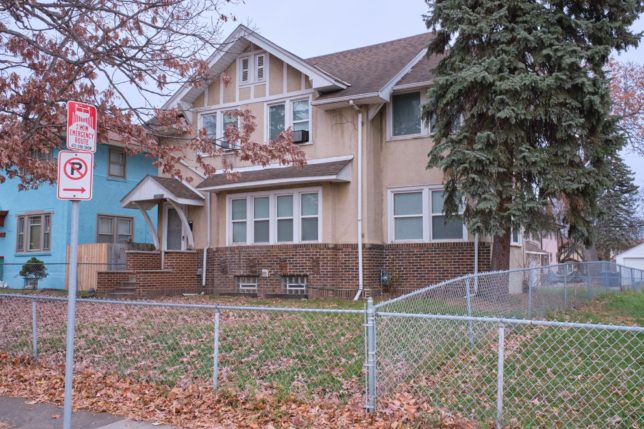
The Minneapolis Public Housing Authority’s official policy states on page 47 that public housing residents will pay no more than 30% of monthly income on rent, aligning with federal regulations that govern public housing rent computation across the country. This 30% income rent limit also applies to housing subsidized through voucher programs like Section 8. Recently, MPHA and its YIMBY allies paraded this fact when defending the privatization of sixteen Scattered Site units across the city. But this argument glosses over two important caveats. First, once public housing is privatized there is no guarantee that rental rates of 30% of income will continue indefinitely. Second, rent isn’t the only payment one makes for housing. Renters pay all kinds of fees in addition to monthly rent. Frequently, Minneapolis public housing residents see charges of substantially more than 30% of their income on their monthly invoices, a problem that is getting worse as their homes are privatized through the Section 18 Demolition and Disposition conversion program.
MPHA Claiming that residents will always pay 30% of income in rent. This is a false statement.
As a public agency, Minneapolis Public Housing Authority (MPHA) says they don’t charge more than 30% of income in rent. But according to public housing residents’ experiences, MPHA has found another way to financially burden residents through ambiguous fees, greedily taking in even more money from residents who barely can afford 30% of income for rent. For public housing, maintenance costs associated with “normal wear and tear” must be covered by rental payments, by federal regulation. However, MPHA tenants report that unless they specifically state that maintenance costs are due to “normal wear and tear”, MPHA will levy an additional charge. On top of this, the repairs are usually scattershot, creating cycles of ongoing maintenance issues because MPHA doesn’t care about tenants’ health and wellbeing.
This is a bad faith attempt on the part of MPHA to take more and more money from their residents. Using data obtained from MPHA through a data practices request, we have uncovered a troubling trend. Over the course of the pandemic, MPHA has steadily increased the average amount of maintenance charges. Residents pointed out that with children at home using amenities more frequently and attending school virtually, there was a higher demand for maintenance and also higher utility bills. But while other public agencies were providing stimulus, MPHA decided to demand even more money from their tenants.
Increasing maintenance charges during pandemic. Dark blue dots represent average charges at each 2.5 week period
While we will not be publishing specific rental statements specifically because residents already fear harassment and retaliation from MPHA, evidence from residents’ rental statements provides further insight into this troubling trend. These fees have been administered inconsistently and opaquely. MPHA levies additional charges for routine maintenance without providing sufficient explanations for how expected payment amounts are computed. Further, MPHA’s inconsistent and sloppy bookkeeping has led to other inconsistencies. Some residents have reported being billed for the rent of family members who had already moved out. MPHA’s financial practices are opaque and messy precisely because the agency wants to extort as much as possible from its residents. Its goal has been to eradicate and privatize public housing and one way to accomplish that is to punish current public housing residents.
The pandemic coincided with MPHA privatizing and converting many scattered site single-family public housing units into Section 8 housing through the Section 18 conversion process. Despite living in the same house for decades, after Section 18 conversion, some residents were made to pay new security deposits and move-in fees, just because their landlord had changed from MPHA to Community Housing Resources – the nonprofit developer MPHA created to hold scattered site housing on the private market. Additionally, after Section 18 conversion, some residents have been surprised by a fee of over $1,000 dollars named the “PBV HAP Charge”. HAP stands for Housing Assistance Program, a contract that Public Housing Authorities sign with private (sometimes nonprofit) landlords after conversion. This charge appears on resident’s billing statements with no context, and makes little sense. HAP contracts involve PHAs transferring money to landlords, so why is MPHA putting residents on the hook for a contract that they sign with Community Housing Resources or one of their three shell companies?
The ostensible purpose of Section 18 and RAD, according to both MPHA and HUD, is to free up more public funding to cover wear and tear maintenance. However, in Minneapolis, residents remain on the hook for maintenance fees even after Section 18 conversion occurs. In some cases, fees actually increase after privatization. For example, after Section 18 conversion, some residents have reported fees equalling up to 10% of rent for maintenance charges as routine as sink repairs.
Clearly, RAD and Section 18 have nothing to do with supporting residents’ maintenance needs. If that were the case, residents would no longer be subject to maintenance charges after MPHA converted their homes to private housing. Instead, MPHA’s private shell companies continue to charge maintenance fees, and now have no obligation to continue to house residents who formerly lived in public housing. All of this continues to show that MPHA never intended to keep its repeated promises. In this video at the Minneapolis City Council, Housing & Development Committee, on February 5th, 2020, ( @ 13 minutes), Tracy Scott, the former Deputy Director of MPHA lobbied for MPHA’s Section 18 privatization/conversion of over 730 single- family public housing homes ( aka scattered sites). Tracy Scott strongly stated Section 18 Demolition & Disposition will change nothing and there will be no displacement of tenants. Tracy Scott says MPHA needs to convert to Section 18 because MPHA will receive only extra $3 million for needed repairs and maintenance. This is in addition to the 42% increase MPHA received from HUD for repair and wear and tire. MPHA has yet to disclose how this money is being spent. At this time, the Housing & Development Committee was chaired by Cam Gordon and vice chair Jeremiah Ellison. Check out how Lisa Bender and Lisa Goodman supported MPHA’s decision to privatize public housing, and Lisa Goodman stated that the council does not have authority over MPHA which is false. Now, our campaign received messages from public housing families in scattered- sites that went through the Section 18 privatization. They are now being pressured to move out of their units by MPHA staff, and in return MPHA will give them Section 8 Vouchers to look for housing in the private market. In addition to the high maintenance fees and unlawful second security deposits, this is the classic formula to push out low income tenants from public housing. MPHA and City of Minneapolis can demolish the units and build “ affordable buildings” that are not affordable for current.
Sources:
https://www.dgphc.org/2019/07/10/section-18-demolition-disposition-a-fact-sheet/
Housing & Development Committee, February 5th, 2020
https://www.youtube.com/watch?v=1G4moPB-zP0&t=1696s
https://www.dgphc.org/2021/10/27/city-council-pushes-mayor-freys-displacement-agenda/
https://www.dgphc.org/2021/11/14/urgentcalltoaction/
https://www.dgphc.org/2021/06/29/mpha-creates-shell-companies-to-privatize-public-housing/
Defend Glendale & Public Housing Coalition
defendglendale @ gmail. com | www.dgphc.org | facebook @ defendglendale
612-389-8527
P.O. Box 14616, Minneapolis, MN 55414
#KeepPublicHousingPublic #BuildMorePublicHousing #StopMPHA #DefendScatteredSites #StopSection18 #DefendElliotTwins #StopRAD #SayNoToGentrification #StopPrivatization #DGPHC #PHIMBY #AbolishFaircloth
#StopFrey
